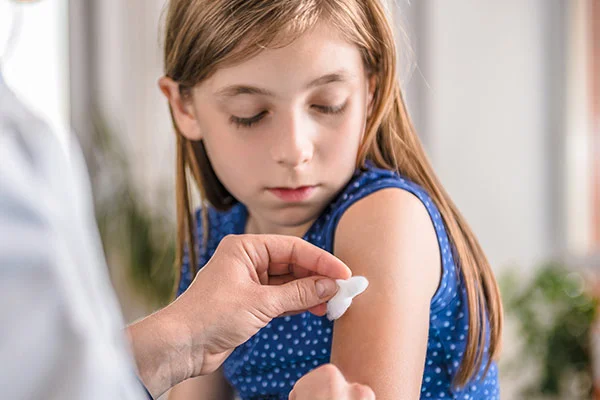Erectile dysfunction (ED) is a consistent inability to have an erection firm enough for sexual intercourse. The condition includes the total inability to have an erection and the inability to sustain an erection.
Yep, guys, it’s time to face facts. Just like women, you need to see your doctor regularly. The only way to find out if you have high blood pressure, for example, is to have it checked. High blood sugar and high cholesterol levels also may not have any symptoms in the early stages. Simple blood tests can check for these conditions. Here are other reasons to make that appointment:
Read MoreWhen it comes to your child’s immunizations, good record keeping is important, says the U.S. Centers for Disease Control and Prevention. Copies are often needed for enrollment in childcare, school or summer camp.
Read MoreMeningococcal disease is not very common in the U.S., but teens and young adults are at increased risk. Fortunately, there are vaccines to help prevent the most common types of meningococcal disease. This is a very serious illness where death can occur in as little as a few hours, so it’s important for parents to talk with their child’s doctor about vaccination.
Read MoreYour pharmacist is ready to advise you when you need home healthcare products. And you’d be surprised at the many products that are available today!
Read MoreWhether it’s due to a disability, a long-term illness or you’re recovering after an operation, sometimes you need a little help with the daily tasks in life. In these situations, a quality home healthcare product can make ordinary tasks less difficult and allow you to maintain your independence. From walkers and wheelchairs, to incontinence and ostomy care, your local Good Neighbor Pharmacy® has the supplies and equipment you need to lead a full and healthy life, including:
Read MoreHuman Immunodeficiency Virus (HIV) attacks the immune system. It stays in the body for life, but treatment can keep it under control and keep the immune system healthy. Without medication, people with HIV can develop AIDS (Acquired Immune Deficiency Syndrome). AIDS is the most advanced stage of an HIV infection, when the immune system can no longer fight infections. Someone with AIDS has both HIV and at least one of a specific list of “AIDS-defining” diseases, which includes tuberculosis, pneumonia and some types of cancer.
Read MoreTeaching kids how to pack their own lunches can be a fun back-to- school activity. The U.S. Department of Health and Human Services has some great suggestions:
Read MoreWhen your heart pumps blood, the blood pushes against the walls of your blood vessels. This creates blood pressure. You need blood pressure to move blood throughout your body, so every part of your body can get the oxygen it needs.
Read MoreChances are, you already know that physical activity is good for you. “Sure,” you may say, “when I get out and move around, I know it helps me to feel and look better.” But you may not realize just how important regular physical activity is to your health. According to the U.S. Surgeon General’s Report on Physical Activity and Health, inactive people are nearly twice as likely to develop heart disease as those who are more active. This is true even if you have no other conditions or habits that increase your risk for heart disease.
Read MoreFor years we’ve heard about the health pitfalls of eating too many eggs. Once knocked for their high cholesterol content by many in the medical community, eggs now seem to be making a modest comeback.
Read MoreIt’s possible to fit healthy vegetables and fruits into even a tight grocery budget. There are many low-cost ways to meet your produce needs. Try these tips.
Read MoreMost of us instinctively know that taking a walk in a forest is good for us. We take a break from the rush of our daily lives. We enjoy the beauty and peace of being in a natural setting. Now, research is showing that visiting a forest has real, quantifiable health benefits, both mental and physical. Even five minutes around trees or in green spaces may improve our health.
Gardening is a great way to not only enjoy fresh air and the outdoors but to increase your physical activity, too. You may think of gardening mainly as a fun activity or a way to grow food for your family, but it’s also a good way to add more physical activity to your day. It can help strengthen bones and joints, lower blood pressure and help manage stress.
Read MoreThe American Cancer Society (ACS) recommends these cancer- screening guidelines. Ask your doctor if you should begin any of these tests earlier based on your or your family’s medical history.
Q: Recently I’ve started noticing dandruff flakes. What is the best way to eliminate dandruff?
Read MoreSwimmer’s ear is a painful condition of the outer ear resulting from inflammation, irritation or infection. Symptoms often occur after water gets trapped in the ear, with subsequent spread of bacteria or fungal organisms, according to the American Academy of Otolaryngology. The infection can begin with increased moisture trapped in the ear canal from baths, showers, swimming or moist environments. The most common symptoms of swimmer’s ear are itching inside the ear and pain that gets worse when you tug on the outer ear. Other symptoms may include:
Read MoreSkin and foot care is especially important when you have diabetes. Poor blood-glucose control increases the risk for skin and foot infection. Nerve damage due to diabetes also makes you less likely to feel pain. If the foot or skin is injured, wounds may heal slowly. If the wound is not treated correctly, severe infection can lead to gangrene and amputation.
Read MoreIf you have diabetes, you know how challenging it can be to manage your disease. One of those challenges involves learning how to treat your condition in the workplace in a safe and private manner.
Read Moret’s almost that time of year again. Time to think about getting your annual flu shot, of course. (The vaccine can keep you from getting the flu, and if you do get the virus, it will likely be a milder case.) It’s also time for another September task: preparing your family’s medicine cabinet for the winter months ahead.
Read More



















